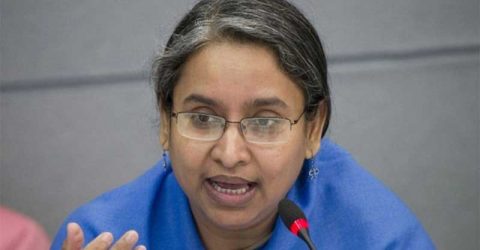
Only four days ago on 16 December, 2021, Bangladesh stepped into its 50th year of existence. Thus, it is appropriate to look back over the five decades of its existence to form an overview of its progress or otherwise. Not unimportant is to examine one aspect or a national weak point that harasses Bangladesh in its move forward.
A class of people in Bangladesh are seen very good at imprinting into the minds of their fellow countrymen and, more significantly foreigners, the notion that their country is small and insignificant in all respects. They are the ardent practitioners of negativism cruelly trying to pale into insignificance the blood, sweat and tears of successive generations of Bangladeshi people to make their land of birth and upbringing an entity of some importance. The negativists had their foreign backers in the past and continue to have them now. Needless to say, the casualty of this negativism is the country’s appeal to foreign investors. Foreign businesses willing to invest in the Bangladesh economy, they rethink and ultimately give up their plans of investing in this country. Foreign tourists with an interest to come to Bangladesh, they never arrive. Bangladesh loses in many other ways from this poor image which it does not deserve. Henry Kissinger, the very famous former US Secretary of State started it all by describing Bangladesh as a ” bottomless basket ” in its post-independence period meaning that this country was destined to be a hopeless and endless case of international charity that would go down the chute of its corruption and other ills with no substantial impact of the international assistance on its developmental goals.
The picture painted by Kissinger of Bangladesh was one that subsisted entirely on foreign dole with no hope of its rising up. But today’s Bangladesh is a different story. It pays nearly fifty per cent of the costs of its annual development plan (ADP) and raises entirely the resources for its administrative budget. It is noted for relying less and less on foreign aid for its sustenance and meeting the needs of its developmental activities from its own resources
Fifty years down the road, Kissinger’s description of Bangladesh has been, no doubt, resoundingly proven wrong. Unlike the failed states with which Kissinger sought to bracket Bangladesh, Bangladesh has slowly but steadily made progress in different spheres without ever back sliding to carve out a place of respect in the family of nations. There can be no denying that Bangladesh’s march forward in every sphere could be more impressive and its performance remains below the potential in different areas. But this ought not to detract attention from the fact either that its slow but steady progress and consolidation of the same ought to create the right image of Bangladesh as a hardworking and resilient nation which is struggling with the odds and slowly but surely coming up the ladder.
It has become self sufficient in food production despite being one of the most populous countries of the world . It has developed a first class export-oriented apparel industry and is number two among the top apparel exporting countries. Its shipbuilding, pharmaceutical and IT industries are fast emerging to be counted in a major way in the international scene.
It has become a coveted market of nearly 90 million people with an existence above the poverty line. The most dependable international rating agencies such as Goldman Sachs had no hesitation in identifying Bangladesh some years ago to become a growing economic powerhouse in the near future. Heads of international development agencies now predict that Bangladesh would be the world’s 25th biggest economy by 2030 when there are 196 countries in the world. Bangladesh had a population of 75 million in 1971 but out of this number only about 20 million people had an existence above the poverty line. The population of Bangladesh has doubled in these thirty years to over 160 million. But nearly 60 per cent of this vast doubled population have an existence above the poverty line which gives some idea about its Herculean successes attained to banish poverty on a sustainable basis. Bangladesh is also doing a wonderful job of feeding its vast doubled population. Its import of food grains is nominal suggesting its sustainable great success in achieving higher agricultural productivity.
It has had other successes also in building an industrial base for producing all kinds of essential consumer as well as intermediate products and a wide range of capital equipment. It is currently showing special promise in areas like shipbuilding, pharmaceuticals, information technologies (IT) and outsourcing business. Bangladeshis in greater number are seen who are able to take on enterprise in diverse fields. This growing entrepreneurial flair holds out the best assurance that this country would continue to improve its economic status while bestowing the benefits of its economic growth and development among more and more people in the future.
There is also impatience with the rate of progress in Bangladesh and impatience about mal governance. But this is probably a plus point. Sensitivity to improper governance and social backlash to the same create the conditions for reformations in all human societies and help them to press ahead towards a better destiny. Thus, there is hope in the present conditions of Bangladesh. One may rightly hope that the present political discords and uncertainties will give way to a happier time with fuller democracy, better rule of law, accountability and transparency of government, parliament, etc., becoming the stronger in Bangladesh to really secure the future of the country in all respects. For the moment, however, there are certainly strong points in favour of Bangladesh. Notwithstanding the present bitter focus on Bangladesh as one of the worst corruption afflicted countries , the reality is that Bangladesh is no Somali or Ethiopia where people starve in millions and warlordism hold sway in place of a constitution or government. Indeed, the conditions in Bangladesh are far better than many countries of the world and it only requires caring and non prejudiced eyes to see its real strengths and potential.
Nation building can be a long story notwithstanding the eagerness of those who are accustomed to speed in all matters. Thus, there is no reason to be so deeply pessimistic about the future of Bangladesh.




